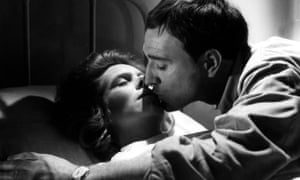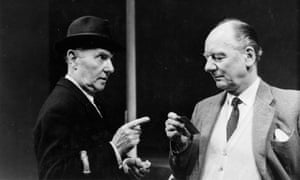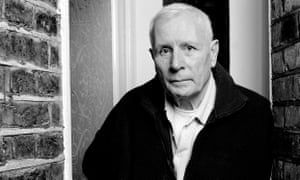 |
| David Storey |
David Storey obituary
Author of This Sporting Life whose raw, realistic plays and novels reflected on family, atonement and the north-south divideMichael Coveney
Mon 27 Mar 2017
David Storey, who has died aged 83, was an unusual literary figure in being as well known for writing novels as he was for writing plays, never claiming that one discipline was harder or easier than the other, but achieving distinction in both, often overlapping, fields. He sprang to prominence with his first novel, This Sporting Life, in 1960; his 1963 movie adaptation, directed by Lindsay Anderson, and starring Richard Harris and Rachel Roberts, was an outstanding example of the new wave of British film, in its raw black-and-white northern realism and its brutal story of a miner turned professional rugby player and his widowed landlady.
Storey, the big and burly son of a Yorkshire miner, played rugby league for Leeds in the early 1950s while also studying fine art at the Slade school in London. His recurring themes, on stage and page, were defined by this dual experience; and by the conflict between his roots in the north and a sense of powerful dislocation in the south, as well as feelings of guilt and atonement in family life.
His career-long association with Anderson blossomed at the Royal Court theatre, London, in an extraordinary flush of plays between 1969 and 1971: In Celebration, in which three sons return home for their parents’ 40th wedding anniversary; The Contractor, in which a tent for a wedding reception is erected and then dismantled; Home, an enigmatic, poetic study of elderly patients in a mental asylum, first played, unforgettably, by John Gielgud and Ralph Richardson; and The Changing Room, a gritty realist drama set in a rugby league locker room. Storey himself said that, after years of struggle and rejection, a dam had burst; none of these fine plays, impeccably directed by the irascible Anderson, took more than five days to write.
In the middle of this period, Hilary Spurling, who was then reviewing plays for the Spectator, was denied free tickets by Anderson, who declared that he did not find her attitude to his and Storey’s work “illuminating, and we do not believe that it furthers our relationship with the public”. The Arts Council intervened and threatened the theatre with punitive financial measures if Spurling was not reinstated on its press list.
The incident illuminated the spirit of entrenchment and defiance in the Court’s work at this time. On another occasion, in 1976, the critics were passing through the circle on the way to a small production in the Theatre Upstairs, a week after delivering indifferent notices of Storey’s Mother’s Day downstairs. They were accosted en masse by Storey; Michael Billington was cuffed around the head by the irate playwright shouting “id-i-ot” before Storey was restrained by Irving Wardle.

Rachel Roberts and Richard Harris in Lindsay Anderson’s 1963 film of This Sporting Life. Photograph: ITV/Rex Shutterstock
Storey was born in Wakefield, West Yorkshire, the son of Frank Storey and his wife Lily (nee Cartwright), and was educated at the Queen Elizabeth grammar school in Wakefield, before attending the Slade School of Fine Art between 1953 and 1956. As a teenager, he worked for a tent contractor in Wakefield (the same firm supplied the original tent for The Contractor) and later as a teacher in a school behind King’s Cross, London, as he turned out his fiction.
Although This Sporting Life was soon followed by the award-winning Flight into Camden (1961), in which a miner’s daughter falls in love with a married teacher and goes to live with him in London, Storey was impatient “to get something down quickly,” and he tried a play; he had seen Hamlet at the Grand in Leeds when he was eight, but had hardly bothered with the theatre since.
That first play, To Die With the Philistines, was rejected by every theatrical management in Britain in 1961, Storey said. However, six years later a young director at the Royal Court, Gordon McDougall, recalled its portrait of a puritanical schoolmaster veering into madness, beset by a jealous wife, the dialogue flecked with passages of unusual, humorous rhetoric, when looking to make an impact as the new director of the Traverse theatre in Edinburgh.
Retitled The Restoration of Arnold Middleton, the play was remounted at the Royal Court in 1967, directed by Robert Kidd, and won Storey a half-share of the Evening Standard’s most promising playwright award that year; his fellow winner was another unknown, Tom Stoppard, also for his first success, Rosencrantz and Guildenstern Are Dead.
One of the distinctive features of Storey’s playwriting was the voice it gave to the new breed of working-class actors that straddled the first and second waves of new writing at the Royal Court. The three brothers in In Celebration, for instance, were played by Alan Bates, James Bolam and Brian Cox, their parents by Bill Owen and Constance Chapman. When the production was filmed by Anderson in 1974, he said that this was “probably the most complete and authentic record of Royal Court playing and directing”.
At the same time, there were other significant partnerships between writers and directors in Sloane Square: John Osborne and Tony Richardson, Edward Bond and William Gaskill, Christopher Hampton and Kidd, while Arnold Wesker and, later, Peter Shaffer had equally creative relationships with another Court director, John Dexter. It was a golden age, but Storey was never seduced by the trappings of West End and Broadway success.
There was a nine-year gap in his novels between Radcliffe (1963) and Pasmore (1972), in which a college lecturer drifts through his own past like a ghost after his marriage breaks up. Two novels in 1973 – A Temporary Life and Edward – were followed by the Booker-prizewinning Saville (1976), a big and complex work notable for its meticulous recreation of a Yorkshire boyhood.
The Royal Court stream continued with the enigmatic Cromwell (1973), which Anderson disliked, written at the height of the Troubles and the Vietnam war; Anthony Page took over, directing Cox as a recruit turned pacifist and Albert Finney as an Irish labourer. But Anderson was back in harness for The Farm (1973), an echo of In Celebration, this time with three daughters, and Life Class (1974), in which Bates played a sort of existential Prospero of an art teacher in a richly allegorical, and underrated, play drawing on Storey’s drawings, with a nude female model unselfconsciously played by Rosemary Martin.
Times and tastes had changed at the Royal Court, and Storey’s last three stage plays, all directed by Anderson, surfaced at the National Theatre: there were more strange and poetic riffs for Ralph Richardson in Early Days (1980); an update on the family in Pasmore, and more echoes of In Celebration, in The March on Russia (1989); and a dramatically inert distillation of many earlier plays in Stages (1992). Anderson died in 1994, and Storey retreated from the theatre, though he did write one or two more unproduced plays.
He published a collection of poems in 1992, and later novels included A Serious Man (1998) – a study of a playwright, pitman’s son, painter and novelist as his life falls apart (Bates had played the character, Richard Fenchurch, in Stages) – and Thin-Ice Skater (2004), full of terse, tense dialogue in a bleak Hampstead hinterland.
In later years, Storey still cut an imposing, distinctive, white-haired figure, lumbering around Hampstead in a large overcoat and comfortable trainers. He kept on writing and drawing, and in summer 2016 an exhibition of his artwork was held at the Hepworth Gallery in Wakefield.
His wife, Barbara (nee Hamilton), whom he married in 1956, died in 2015. He is survived by their two sons and two daughters.
• David Malcolm Storey, playwright and novelist, born 13 July 1933; died 27 March 2017

Ralph Richardson, left, and John Gielgud in the Royal Court’s production of Home, 1970. Photograph: Evening Standard/Getty Images
THE GUARDIAN



No comments:
Post a Comment